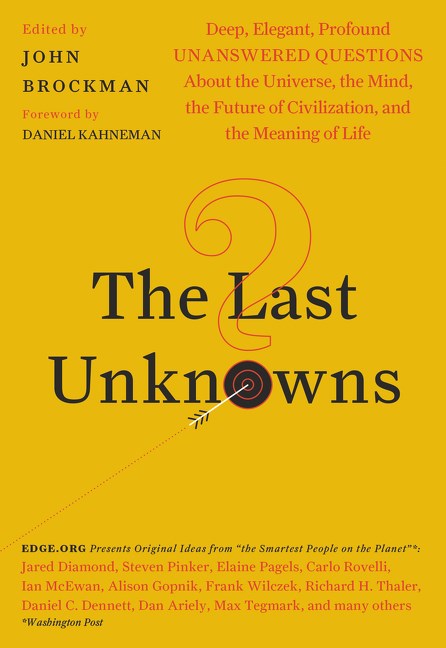The Last Unknowns: Deep, Elegant, Profound Unanswered Questions about the Universe, the Mind, the Future of Civilization, and the Meaning of Life
June 04, 2019
An excerpt from Daniel Kahneman's Foreword to the conclusion to the Edge Question Series, the world’s bestselling science book series, with more than one million copies sold.

John Brockman's Edge Question Series books have been fascinating to follow for over a decade now. With titles like This Explains Everything: Deep, Beautiful, and Elegant Theories of How the World Works, What We Believe but Cannot Prove: Today's Leading Thinkers on Science in the Age of Certainty, The Universe: Leading Scientists Explore the Origin, Mysteries, and Future of the Cosmos, and What Should We Be Worried About?: Real Scenarios That Keep Scientists Up at Night, the series clearly doesn't shy away from big questions—and there are so many more like that asked in the series, which has sold over a million copies.
The Last Unknowns: Deep, Elegant, Profound Unanswered Questions about the Universe, the Mind, the Future of Civilization, and the Meaning of Life, the conclusion to the series, hits bookstore shelves today. Being the last of the series, it is fitting that it leaves us with some of today's great thinkers' last questions.
This is a book of questions—only questions. In these pages are the universe’s last and greatest unknowns. Here are the riddles that have fascinated, perplexed, and obsessed today’s greatest minds. … Every great thinker has his or her “ultimate question,” the unknown that, if answered, could unlock the secrets of our world, our civilization, and even the meaning of life. And so, John Brockman asked 284 of the world’s leading scientists, academics, artists, and intellectuals, “What is ‘The Last Question,’ your last question, the question for which you will be remembered?”
Below, we have the introduction to the book, written by another of today's great minds—the author of Thinking, Fast and Slow—Daniel Kahneman. In it, he talks about what makes the series, and the site that it spawned from, so special.
◊◊◊◊◊
Foreword: On Edge
It seems like yesterday, but Edge has been up and running for twenty-two years. Twenty-two years in which it has channeled a fast-flowing river of ideas from the academic world to the intellectually curious public. The range of topics runs from the cosmos to the mind, and every piece allows the reader at least a glimpse and often a serious look at the intellectual world of a thought leader in a dynamic field of science. Presenting challenging thoughts and facts in jargon-free language has also globalized the trade of ideas across scientific disciplines. Edge is a site where anyone can learn, and no one can be bored.
The statistics are awesome: the Edge conversation is a “manuscript” of close to 10 million words, with nearly 1,000 contributors whose work and ideas are presented in more than 350 hours of video, 750 transcribed conversations, and thousands of brief essays. And these activities have resulted in the publication of 19 printed volumes of short essays and lectures in English and in foreign language editions throughout the world.
The public response has been equally impressive: Edge’s influence is evident in its Google Page Rank of 8, the same as The Atlantic, The Economist, The New Yorker, and the Washington Post; in the enthusiastic reviews in major general-interest outlets; and in the more than 700,000 books sold. Of course, none of this would have been possible without the increasingly eager participation of scientists in the Edge enterprise. And a surprise: brilliant scientists can also write brilliantly! Answering the Edge question evidently became part of the annual schedule of many major figures in diverse fields of research, and the steadily growing number of responses is another measure of the growing influence of the Edge phenomenon. Is now the right time to stop? Many readers and writers will miss further installments of the annual Edge question—they should be on the lookout for the next form in which the Edge spirit will manifest itself.
What is the secret of Edge’s success? To begin with, the charisma of John Brockman, its founder and leader. Add to that his eclectic but discerning taste in the choice of participants. The two major formats of Edge activities are no less important. The interviews are edited to make the interviewer invisible. Masking the questioner is not new, but remarkable skill is required to elicit both clarity and depth in seamless expositions of the participants’ ideas. Edge interviews read and sound like coherently constructed informal lectures—a surprising feat when the flow of the content is entirely driven by the interviewer’s questions.
The short-essay format of the Edge Annual Question is a daring innovation and a striking success. Apparently, 600–1,000 words is the sweet spot for introducing one big idea. The brevity disciplines the author and allows the reader to grasp the essential point—and to remain hungry for more even as she moves to another essay.
The unifying message in the story of Edge is that ideas matter, and they matter to many. They can be told with elegance, sometimes with wit, never with condescension. There is a large audience eager to learn what scientists in various disciplines are up to, and a large group of scientist-teachers eager to tell their stories. And certainly, there will be more stories.
—Daniel Kahneman
New York City
Excerpted from The Last Unknowns: Deep, Elegant, Profound Unanswered Questions about the Universe, the Mind, the Future of Civilization, and the Meaning of Life.
Published by William Morrow, an imprint of HarperCollins Publishers.
Copyright © 2019 by Edge Foundation.
All rights reserved.
ABOUT THE EDITOR
The founder and publisher of the online science salon Edge.org, John Brockman is the editor of This Idea Is Brilliant, This Explains Everything, This Will Make You Smarter, and other volumes. He is the CEO of the literary agency Brockman Inc. and lives in New York City.

